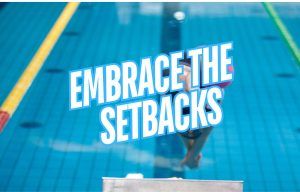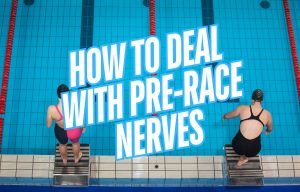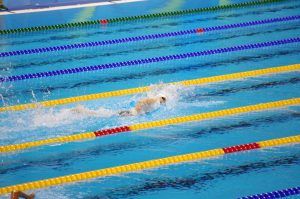
6 Benefits of Visualization for Swimmers
Wondering what visualization can do for your swimming? Here are some evidence-based benefits of visualization for swimmers for more confidence, less choking, and even better technique.

When dealing with pre-race nerves, or stress before a big, brutal and certified not-awesome main set, the expectation most swimmers have is to rid themselves of the feelings of anxiety.
They put on a pair of boxing gloves and try to knock out the stress.
Whether it’s by breathing techniques (which can help a little), or telling themselves to toughen up (which usually makes things worse), swimmers work themselves into a frothy, anxious mess trying to feel less anxious.
Part of this is because they’ve been misled on anxiety and stress and its role in performance.
(“Stress is bad! Eliminate stress!”)
The truth is, the increased heart rate, sweaty palms, and the churning belly are normal.
It’s the way we have been framing that stress and anxiety is what has been causing us problems, not the stress and anxiety itself.
Here’s how some rational and non-delusional reframing can inspire much more productive responses to stressful situations, and allow us to get to work on swimming fast when it matters most.
Let’s dive right in!
For a long time, our culture has demonized stress.
Everywhere you look there are solutions, books, and even courses to help you be less stressed out.
But taking something that is inevitable and normal and demonizing it means we have been approaching how to use the body’s physiological response to a stressful event in a completely backwards way.
By trying to rid ourselves of the symptoms that happen with pre-race nerves, we end up making things significantly worse than they would be otherwise.
I understand the temptation to try and eliminate stress and the uncomfortable feelings that come along with it.
But the response to stress actually gives us a lot of good stuff:
And so on.
While extended, long-term stress is not good and can cause poor health outcomes, short-term stress responses are actually a resource and a pathway to improved performance.
Here’s some Science McScience on how to use stress like a champion for better racing performances and swimming better during those tough sets at practice.
There is a growing body of research that shows just how powerful properly interpreting the stress response can be.
One study showed that a group of collegiate kids (over 330 in total) performed much better on math exams when they simply read a short paragraph on how stress and anxiety wasn’t something to worry about and that it could actually help them perform better.
Here was the paragraph:
People think that feeling anxious while taking a standardized test will make them do poorly on the test. However, recent research suggests that arousal doesn’t hurt performance on these tests and can even help performance—people who feel anxious during a test actually do better. This means that you shouldn’t feel concerned if you do feel anxious while taking today’s GRE test. If you find yourself feeling anxious, simply remind yourself that you arousal could be helping you do well.
Pretty innocuous, right?
The group who read the passage averaged a score of 770 on the math exam, while the control group, who were told to ignore the stress and anxiety they were feeling, averaged 706.
These improvements held up even months later1.
Further research looked to see if reappraisal affected the physiological response to stress.
A group of 50 participants2 were recruited and tasked with doing the Trier Social Stress Test (which is as stressful as it sounds—it includes a short oral presentation about their own strength and weaknesses followed immediately by an arithmetic test).
The participants were separated into two groups:
While both groups had a lot of the earmarks of stress: racing heart and anxious feelings, the intervention group had a significantly better cardiovascular response.
Blood flow was more efficiently moving around the body (including the brain, which accounts for the increased cognitive performance in the math test study we just looked at).
The control group, on the other hand, felt constricted and tense.
If that sounds like the difference between performing and choking, you would be correct!
Of all of the maxims I heard on the pool deck growing up and to this day, there are fewer that rankle my swim cap more than hearing a swimmer be told “Get over it” or “Toughen up” in the moments they are feeling pre-race nerves and their confidence is wobbly.
These pieces of advice, ostensibly from a good place, are unhelpful and completely miss the point when it comes to dealing with stress.
Elite performance, both on race day and in practice, happens when an athlete works with what they have instead of trying to fight what they are experiencing.
Trying to suppress stress and anxiety is like trying to stop an avalanche.
You can yell and stomp your feet at it, but it’s just going to bury you.
Instead, ride that thing all the way down the mountain.
You cannot out-fight or smother the body’s physiological and completely natural response to stress.
The harder you try and stop it, the more frustrated and hopeless you feel, and instead of being energized from the nerves and stress, you are left tense and wildly wound-up.
The research mentioned earlier found that students who were told to ignore stress and to block it out (engaging in something called “stress avoidance”) saw their performance continue to decline over time.
In other words, “getting over it” won’t help you swim faster, and if anything, will just make things worse.
The goal with stress reappraisal isn’t to rid yourself of the feelings of stress and anxiety.
It’s to change your outlook and interpretation of anxiety.
And the good news is that you aren’t trying to trick or delude yourself.
Here are a couple ways that you can start putting this into practice for yourself:
Think back to the times where the pressure is on, and yet, you thrived.
What was your mindset like?
You were nervous, but you appreciated that the nerves were helping you focus and perform better.
The cool thing about interpreting stress in a healthy way is that you’ve already got the track record of having done it!
All you need to do is draw from those experiences for future performances.
Some research with students prior to a math test found that simply saying “I’m excited” versus “I’m anxious” showed that the simple twist in language yielded significant improvements in test scores.
Using smarter language allows you to take control of the narrative and puts you in the driver’s seat.
Examples include:
The language differences are subtle, but when your body is on red alert, emotions are running high, and that personal best time is on the line, a little bit of framing can go a long way.
Swimming fast isn’t all that complicated, when you break it down to its simplest parts.
Get to the other side of the pool and back as fast as you can.
But we tend to over-complicate things and even make things worse by using strategies that don’t work.
Properly framing stress and anxiety is something simple that you can start doing today to channel the energized state that comes with facing down a big challenge.
Use that energy, swim your little heart out, and tell those personal best times who is boss.
This Mental Training Workbook Will Help You Swim Like a Rock Star This Season. Confused about mental training? Want to unleash pro mode on your swimming this year? Learn how this mental training workbook will change your mindset and help you pummel your PB’s this season.
Why Change is So Hard in the Pool (and How to Make It Easier). We all want change in some measure—so why is it so dang difficult to make happen? Here’s the reality behind making change that actually sticks in the pool.

Olivier Poirier-Leroy Olivier Poirier-Leroy is the founder of YourSwimLog.com. He is an author, former national level swimmer, two-time Olympic Trials qualifier, and swim coach.
✅ Free shipping on Orders over $49
✅ Price Match Guarantee
✅ Best selection of gear for training and competition
✅ Fast and Easy Returns

“This is the best book I have ever seen concerning mental training.” — Ray Benecki, Head Coach, The FISH Swim Team


Wondering what visualization can do for your swimming? Here are some evidence-based benefits of visualization for swimmers for more confidence, less choking, and even better technique.

Ready to uncork some best times at your next swim meet? Here’s what you need to know to prepare for a swim meet.

The right mental skills can help you unlock faster swimming on race day. Here is a look at the right skills to use for competition.

Frustrated with setbacks in the pool? Here are some tips for improving your ability to embrace setbacks and swim faster.

Struggling to swim fast under pressure? Here are some tips for how to manage pre-race nerves on race day.

Swimmers often find themselves stuck with doubt when it comes to doing tough things in the water. Here’s a simple question to ask when you find doubt and uncertainty stopping you from excellence.
SITE
SHOP
GUIDES

LANE 6 PUBLISHING LLC © 2012-2025
Join 33,000+ swimmers and swim coaches learning what it takes to swim faster.
Technique tips, training research, mental training skills, and lessons and advice from the best swimmers and coaches on the planet.
No Spam, Ever. Unsubscribe anytime.
